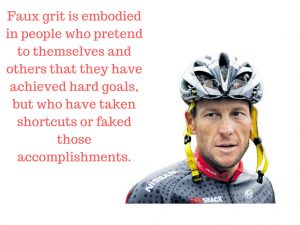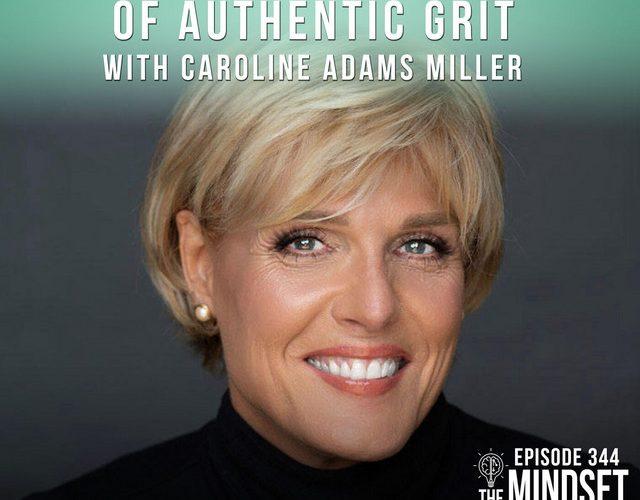August 17. 2017
How and why being a gritty person can help you thrive in life
By Stacey Colino, Contributor | Aug. 17, 2017, at 12:26 p.m.
A funny thing happened to Caroline Adams Miller, an executive coach and speaker specializing in positive psychology, after she finished writing a proposal for a book about grit: Her own grit was seriously tested as she searched for a publisher. This was in 2015, on the eve of the publication of MacArthur Fellow Angela Duckworth’s book “Grit,” which was already getting lots of attention. Many editors were reluctant to compete with Duckworth’s book, so Miller’s proposal was roundly rejected. Undaunted, Miller decided she had something different to say about grit, so she decided to go ahead and write the book even if she had to self-publish it. When another book dropped out of Sounds True’s spring 2017 publishing line up, an editor there contacted Miller and bought her book, which included a positive blurb from Duckworth. That’s grit in action! 
These days, grit – which is often described as having perseverance and passion for achieving personally meaningful long-term goals – is a hot topic in the world of positive psychology. It has even come to be recognized as a major determinant of success and satisfaction in life. “The reality is, you can’t do things that are really worthwhile, useful or meaningful or that make a difference in your own life or in the lives of others in short amounts of time with very little effort – and that’s why a character strength like grit ends up being so distinctive in this world,” says Duckworth, a professor of psychology at the University of Pennsylvania and founder and CEO of the Character Lab, a nonprofit that’s dedicated to advancing the science and practice of character development. “People like to be good at things – that desire for mastery and self-actualization is universal.”

Here are some other things you may not realize about grit:
You Can Have Grit in Some Areas But Not Others
“There are some people who are high in diligence and perseverance with everything,” Miller notes. But others may have grit in certain areas of their lives that really matter to them, such as sports or dance, and not in others, such as school performance. It’s as if they save their mental and physical energy and self-regulation for what’s most important to them. After all, it’s very difficult to give your best effort and full attention to every single aspect of your life, 24/7. So it may be unrealistic to expect yourself to exhibit grit with everything you do.
Not All Forms of Grit Are Good
The best kind of grit is what Miller calls “authentic grit.” People who have authentic grit tend to be hopeful and optimistic and have genuine self-confidence that’s balanced by a healthy dose of humility, Miller explains. They have a growth mindset, believing that hard work will help them succeed and that their curiosity and willingness to take smart risks will help them be flexible as they strive to pursue their goals. Not surprisingly, gritty people learn from setbacks and failures they experience. Gritty people also foster teamwork and camaraderie and create deep connections with others.

Having Grit Doesn’t Mean You Can’t Ever Quit
Grit doesn’t need to involve the relentless pursuit of a particular goal. “You want to have consistent stamina and stick-to-itiveness at the right level,” Duckworth says. For kids, in particular, it’s important to be able to quit certain activities and interests as they explore new experiences and discover what they like or don’t like, Duckworth says. Not every exploration is going to click. “Having grit is about having alignment and harmony between your daily behavior and a vision for yourself in terms of your long-term goals,” Duckworth says. “It’s OK to give up on smaller goals and plans or to be flexible and adaptive about them, while keeping your eye on the big picture.”
Grit Can Protect You From Burnout and Turmoil
A high level of grit is associated with less burnout among doctors, according to a study in the July 2017 issue of Postgraduate Medicine Journal. Meanwhile, a study in the 2015 issue of Psychiatry Research found that college students who experienced negative life events, such as failing a test or breaking up with a significant other, were less likely to experience suicidal ideation four weeks later if they had high levels of grit; by contrast, those with low levels of grit had a stronger association between negative life events and later thoughts of suicide. As the researchers noted, “gritty individuals are defined by their ability to push through hardships.” As Miller says, “The right kind of grit gives you a reason to get up in the morning. You don’t get burnout when you have passion to pursue something that matters to you.”
Grit Can Be Learned
While Duckworth’s research suggests that some of the traits that underlie grit, such as honesty, generosity and talent, are present at birth, many of the characteristics and behaviors associated with grit can be cultivated. “Nature matters and so does nurture,” she says. In order to cultivate the passion that’s a key ingredient of grit, you need to intrinsically enjoy what you’re doing and practice it regularly. “One form of perseverance is the daily discipline of trying to do things better than we did yesterday,” Duckworth explains. You also need to have a sense of purpose – the conviction that your work matters – and a sense of hope, which Duckworth describes as “a rising-to-the-occasion kind of perseverance.” With the pursuit of any meaningful goal, obstacles and setbacks are bound to occur, but it’s how you handle them that will influence your ability to develop grit. When “we get knocked down, if we stay down, grit loses,” Duckworth says. “If we get up, grit prevails.”

Older adults tend to score higher on the Grit Scale, which was developed by Duckworth, than younger adults do, according to Duckworth’s research. Other studies have found grit to be more stable across the lifespan, and the earlier in life you develop grit, the better it may be for your long-term brain health. A 2017 study from Temple University found that having grit in adolescence protects against cognitive decline in late life. While the exact mechanism behind this effect isn’t known, there are theories. “A gritty teenager may be more likely to participate in challenging hobbies or academics that require focus, practice and the learning of new skills, [which] may help strengthen pathways in the brain that foster new learning and higher-order thinking skills,” says lead author Emma Rhodes, a doctoral candidate in clinical psychology at Temple. “It’s also possible that gritty adolescents grow up to be gritty adults, because gritty behaviors are reinforced over time as we learn that hard work and perseverance lead to success.”
To see the article online, click here.




